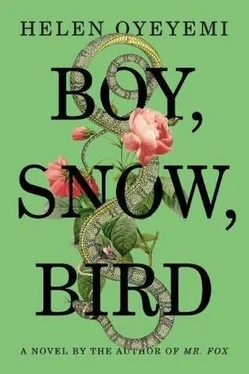“Boy…” He stroked my cheek with the back of his hand.
I described the options to him one by one. I devised a minimum of twenty, each new configuration of body parts arriving in my mind with some kind of diabolical inspiration before I’d even fully dealt with the previous image. I used language that would have made Webster fall down in a faint. I promised him that he could have me in any way that he wanted, then I went on before he could choose. He nuzzled my collarbone a couple of times, and laughed at some of my more outlandish descriptions; because we were so close together and couldn’t see each other clearly, it began to feel as if we were school friends plotting some ridiculous prank. He was a good listener. But I can’t remember now exactly when he stopped listening and I stopped talking, at what point our breathing changed, fingernails dug into skin, and he covered my mouth with his so that I cried out into him. The whole thing kind of astounded me. I’d expected to have to explain to him about my being Winter in Siberia, but in the end I got to keep that to myself.
So there was the man (I began to think of him as mine when I told him about the rat catcher and he half seriously offered to drive down to New York, kneecap him, and bring me back a slice of pie from my favorite diner). And there was the home, with its long, low-ceilinged rooms. The floorboards were so snugly fitted that walking across them was like gliding across a bank of honey. There were no clocks, no real sense of time passing. It was the kind of house you went to in order to get well. Some nights I’d walk back to the boarding house from Arturo’s house and see the stars through the tree branches, nestled in between the leaves as if they’d grown there. It wasn’t just the man and the house, there was more. “I don’t mean much to you, do I?” Arturo teased. “I’m just… you know, Snow’s dad.”
What was it about Snow? Some days she was just another little girl who considered the presence of green vegetables and the absence of a Fluffernutter sandwich on her dinner plate such a great tragedy that she’d cry until her face was swollen. She wasn’t yet seven, but seemed a few years younger. Partly because she hadn’t yet learned to smile even when she didn’t feel like it, and partly because she was inattentive in the way that kids are when they’re still learning to speak — always looking above or behind you while you’re talking to them, their heads wobbling with concentration, as if they’re receiving secret information that’s much more important than anything you have to say. Her eyes were the shade of hazel that doesn’t seem able to decide whether it’s brown or green.
If Snow was ever worried, if any anxieties ever disturbed her for longer than a day, she rarely showed it. She was poised and sympathetic, like a girl who’d just come from the future but didn’t want to brag about it. She’d pat your arm, and say, “Everything is okay. Everything is normal,” and you took her word for it. Sometimes I think it was a trick of hers, deciding aloud what was going on so that everyone who loved her fell over themselves to make it so. Sometimes I think we needed her to be like that and she obliged. It’s sad if that’s true — I’m thinking of the time she crawled down the staircase on her hands and knees to announce that there was a troll in her room. Arturo asked her where exactly the troll was. Under her bed, in the closet? She said: “It is in all the room. Come see.”
I would have gone with her, but Arturo got mad at her for not saying please, of all things, and refused to indulge her. That’s enough, Snow. Back to bed with you . I added: “That silly old troll will be gone by the time you get back into bed. You’ll see.”
She said okay, and went back upstairs slowly, shivering. In the morning I asked her if the troll had disappeared like I’d promised. I asked real quietly, so Arturo didn’t hear. She used a few spoonfuls of applesauce to draw a smiley face on her plate, and when she’d finished, she said: “Mmm hmmm, no more troll.” She was lying, though; I could tell. As far as she was concerned, the troll hadn’t gone anywhere, and would remain just as long as it pleased. All she could do was try to sleep in spite of it. I hate the thought of her trying, trying. Not just with her troll, but with me too, right from the beginning.
—
there’s something ominous about being handed an ivory-colored card with scalloped edges that basically says Hello, I’m your boyfriend’s mother and I’ve heard such a lot about you and do please come to tea at half past five tomorrow . I was in a terrible state about it, sweaty as anything. The general advice is always be yourself, be yourself, which only makes sense if you haven’t got an attitude problem.
Olivia lived two doors down from Arturo, in a bigger house than his, a house full of playthings for her granddaughter. Skipping ropes, tin soldiers, all colors of crayons, and toy cars strewn everywhere. I wondered how many falls Olivia Whitman had had and was going to have just for the sake of keeping a little girl amused. Two other women joined us for tea, and I really felt that wasn’t fair, especially since the other women turned out to be Arturo’s younger sister and Julia’s mother. Olivia really had summoned the committee. I wished I wasn’t wearing violet eye shadow, which was funny, because just half an hour before I’d thought of the eye shadow as armor that I couldn’t have stepped out of the boarding house without. It might have been the darkness of the room — they sat with the curtains drawn, and the only real light seemed to come from the silverware — but it was difficult telling the difference between the three women. Olivia and Agnes had a good excuse for sharing their style and mannerisms, in that they were both in their mid-sixties. Vivian was twenty-three. Twenty-three and wearing a twinset, with her hair in fussy curls. But she had Arturo’s narrow amber eyes. She began by listing everybody she knew in New York and asking me if I’d ever met them. Her perfectly straight face threw me off at first. But by the time she’d got to the seventeenth name or so—“Fernanda Crackenbone. You’ve honestly never run into Fernanda? But she’s awfully sociable. The most sociable girl I know. Goes every place there is to go”—I realized she was kidding around, and also that Olivia and Agnes had been holding their laughter in so that I wouldn’t think they were laughing at me, which accounted for their strangely cramped expressions. When I said, with as much dignity as I could muster, that I didn’t believe there was any such person as Fernanda Crackenbone, Olivia threw up her hands, let herself have a good roar at last, then said: “I’m only glad you don’t think this girl of mine has a screw loose.”
“I do have a screw loose, you know,” Vivian said. “It’s just that Mama doesn’t want anybody to think so. More tea?”
I slipped up twice — once when Olivia talked about Vivian’s progress at law school and what a wonderful singer Julia had been, a classical contralto, no less. Then she asked me what I wanted to do with my life. I said: “Oh, I like it at the bookstore,” and Vivian and Olivia gave each other the briefest but most chilling glance, then changed the subject. Oddly enough, that was when Agnes, Julia’s mother, smiled at me. Her smile was encouraging, though she shook her head a little bit, as if she thought I needed coaching. The second slipup was when Olivia announced that she wanted Arturo to return to academic life. “I didn’t raise my son to be a jeweler,” she said. “My husband didn’t work all the way up from bank clerk to branch manager for that.” When I forgot myself so far as to try to argue with her, she said “outrageous” and rattled the sugar tongs in a manner that was positively alarming.
Читать дальше












